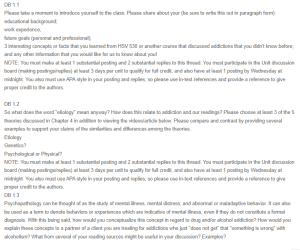Addiction – Etiology and Psychopathology
DB 1.1 Introduction
Hello everyone,
My name is Augusta Ejiofor Sherrod. I hold a Bachelor of Business Management degree from Government College, Nigeria; however, my educational training is not limited to this degree. I further studied and got a Certificate in Nursing Assistant at Mid-Michigan College and am currently pursuing a Bachelor of Science in Human Resource Management at Post University. In my profession, I have engaged in mental health care for more than nine years and operations management for approximately seven years. Presently, I am employed at Michigan House Senior Living, where I care for mental health and supervise medical equipment.
My future professional objectives are to become more proficient in mental health and to seek a higher-ranking position within the human resources department to promote diversity and maintain a healthy and efficient working environment. In the previous course on addiction, I was introduced to issues such as the inherited vulnerability of addiction, neuroplasticity changes that occur due to chronic drug use, and social contexts that lead to addiction. Besides studying and working, my hobbies include volunteering at shelters and raising awareness for mental health disorders. I am eager and ready to interact and learn with all of you throughout this semester.
DB 1.2 Etiology of Addiction
Etiology is derived from Greek and means the science of the cause or causes of any particular disease. Also, it discusses other causes of substance abuse disorders. According to the Genetic Theory, genetic factors play a major role in addiction vulnerabilities since a person who has an addiction-prone family background will easily get addicted to substances (Popescu et al., 2021). Second, the Psychoanalytic Theory emphasizes the role of the mind and human psyche, where people diagnosed with anxiety or depression may use substances to cope. Thirdly, Sociocultural Theory focuses on factors like culture, friends’ influence, and financial status that affect substance dependence (Razaghi et al., 2023). Collectively, these theories offer a rounded perspective on the nature of addiction, acknowledging genetic factors, personal psychological state, and external environmental factors.
DB 1.3 Conceptualizing Psychopathology in Addiction
Abnormal behavior or mental illness, known as psychopathology, is essential in the study of addiction. It is noteworthy that addiction can be viewed as a type of psychopathology, including pathological behavior and pathological mood. When trying to make a partner of a person affected understand, it is crucial to let them know that alcoholism is a disease of the mind, not a personal weakness. Nutt et al. (2021) noted that alcohol addiction causes changes in the brain that allow the user to continue taking alcohol despite adverse consequences. This can be likened to chronic diseases that are managed throughout the patient’s life. Recognizing addiction as a complex mental health disorder enables partners to assist their dear ones in effective ways.
References
Razaghi, E., Farhoudian, A., Pilevari, A., Noroozi, A., Hooshyari, Z., Radfar, R., & Malekinejad, M. (2023). Identification of the socio-cultural barriers of drug addiction treatment in Iran. Heliyon, 9(5), e15566. https://doi.org/10.1016/j.heliyon.2023.e15566
Nutt, D., Hayes, A., Fonville, L., Zafar, R., Palmer, E. O. C., Paterson, L., & Lingford-Hughes, A. (2021). Alcohol and the brain. Nutrients, 13(11), 3938. https://doi.org/10.3390/nu13113938
Popescu, A., Marian, M., Drăgoi, A. M., & Costea, R.-V. (2021). Understanding the genetics and neurobiological pathways behind addiction (Review). Experimental and Therapeutic Medicine, 21(5). https://doi.org/10.3892/etm.2021.9976
ORDER A PLAGIARISM-FREE PAPER HERE
We’ll write everything from scratch
Question
DB 1.1
Please take a moment to introduce yourself to the class. Please share about your (be sure to write this out in paragraph form):
educational background;

Addiction – Etiology and Psychopathology
work experience;
future goals (personal and professional);
3 interesting concepts or facts that you learned from HSV 530 or another course that discussed addictions that you didn’t know before;
and any other information that you would like for us to know about you!
NOTE: You must make at least 1 substantial posting and 2 substantial replies to this thread. You must participate in the Unit discussion board (making postings/replies) at least 3 days per unit to qualify for full credit, and also have at least 1 posting by Wednesday at midnight. You also must use APA style in your posting and replies, so please use in-text references and provide a reference to give proper credit to the authors.
DB 1.2
So what does the word “etiology” mean anyway? How does this relate to addiction and our readings? Please choose at least 3 of the 5 theories discussed in Chapter 4 in addition to viewing the videos/article below. Please compare and contrast by providing several examples to support your claims of the similarities and differences among the theories.
Etiology
Genetics?
Psychological or Physical?
NOTE: You must make at least 1 substantial posting and 2 substantial replies to this thread. You must participate in the Unit discussion board (making postings/replies) at least 3 days per unit to qualify for full credit, and also have at least 1 posting by Wednesday at midnight. You also must use APA style in your posting and replies, so please use in-text references and provide a reference to give proper credit to the authors.
DB 1.3
Psychopathology can be thought of as the study of mental illness, mental distress, and abnormal or maladaptive behavior. It can also be used as a term to denote behaviors or experiences which are indicative of mental illness, even if they do not constitute a formal diagnosis. With this being said, how would you conceptualize this concept in regard to drug and/or alcohol addiction? How would you explain these concepts to a partner of a client you are treating for addictions who just “does not get” that “something is wrong” with alcoholism? What from several of your reading sources might be useful in your discussion? Examples?

